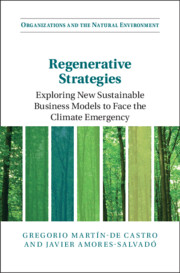Book contents
- Regenerative Strategies
- Organizations and the Natural Environment
- Regenerative Strategies
- Copyright page
- Contents
- Figures
- Tables
- Foreword: Reversing Course
- Acknowledgements
- 1 Introduction
- 2 Assessing the Response to the Climate Grand Challenge
- 3 Business as Usual
- 4 Sustainable Business Models
- 5 Climate Emergency in the Anthropocentric Era
- 6 The Regenerative Strategy
- 7 The Regenerative Strategy
- 8 Concluding Remarks
- Index
- References
1 - Introduction
Published online by Cambridge University Press: 28 March 2024
- Regenerative Strategies
- Organizations and the Natural Environment
- Regenerative Strategies
- Copyright page
- Contents
- Figures
- Tables
- Foreword: Reversing Course
- Acknowledgements
- 1 Introduction
- 2 Assessing the Response to the Climate Grand Challenge
- 3 Business as Usual
- 4 Sustainable Business Models
- 5 Climate Emergency in the Anthropocentric Era
- 6 The Regenerative Strategy
- 7 The Regenerative Strategy
- 8 Concluding Remarks
- Index
- References
Summary
The first and introductory chapter explains the necessity of this book, in other words, why it should be read. Several questions arise to illustrate this: If climate emergency is the grand challenge, why is so difficult to address it? Is it technically feasible? Economically? Trying to address it, we frame the current climate emergency as an extreme case of the well-known phenomenon of ‘the tragedy of the commons’. As a potential solution, we introduce a new disruptive business model and environmental strategy called ‘regenerative’, characterised by two main elements: (1) cutting-edge climate science solutions (capturing and utilising atmospheric carbon dioxide capable of producing net zero and even net negative emissions or positive environmental externalities); and (2) firm purpose redefinition under a new ecological, ethical and moral paradigm. Finally, a brief description of the book’s contents is presented.
Keywords
- Type
- Chapter
- Information
- Regenerative StrategiesExploring New Sustainable Business Models to Face the Climate Emergency, pp. 1 - 9Publisher: Cambridge University PressPrint publication year: 2024



